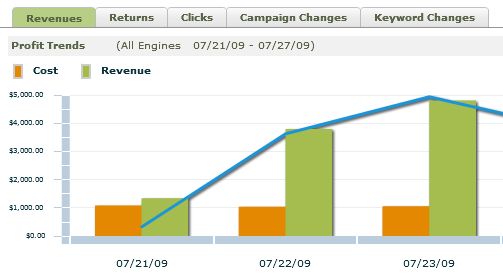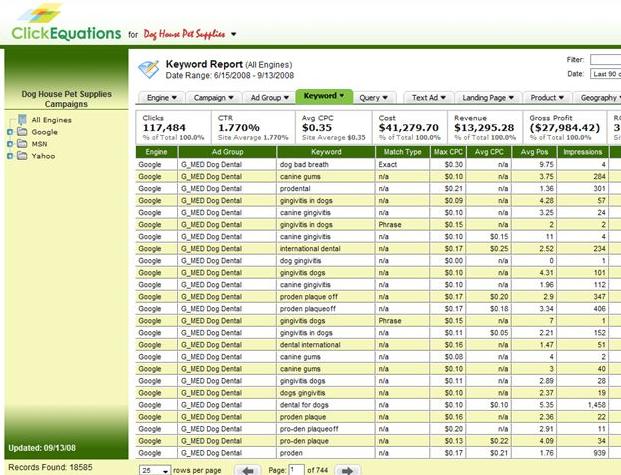The ClickEquations crew say they do what they do best because they were once the customer.
Launched in 2006, the Conshohocken-based company was once strictly a search agency managing mostly large-sized pay-per-click accounts, but founder and president Craig Danuloff and team increasingly found limitations in the tools available for the accounts they handled.
“The best products are the ones created to help the consumer, right?” says Alex Cohen, the company’s marketing manager.
So, that’s what Danuloff, who got involved in e-commerce software as early as 1994, and CEO Lucinda Holt did. The duo moved the company’s focus to developing tools that company’s themselves could use to manage their own paid-search accounts — placing and tracking links listed on search engines by chosen keywords.
Since that private beta launch last August, things have turned out alright, so far, for the company trying to own paid search, which is the targeted, contextual advertising that appears on Web sites, particularly search engines, according to keyword relevance.
Eight investors, including Philadelphia investors Emerald Stage2 Ventures, MentorTech Ventures and Ben Franklin Technology Partners, last month invested $3 million in the firm’s expansion, including growing their development staff to accelerate the number of features they offer. Nautica, Comcast, Liz Claiborne and Forbes Traveler are among their high-profile clients, with other announcements on the way, Cohen says.
For continued growth, ClickEquations will win over lots of companies that aren’t using ad management tool and, Cohen says, explain just why “Google is not your friend.”
“The challenge of advertising in the past was that you didn’t know what was happening. You couldn’t know,” he says. “Now, of course, the problem is that you have more information than most people know what to do with.”
So, the result is most don’t do anything, he says.
“Eighty to 85 percent of the possible market isn’t using any tool at all. Most of the rest are often using what’s available from Google, Yahoo or MSN or what they’ve hacked together themselves,” Cohen says.
The tools from ClickEquations include a Web-based reporting application and an Excel-based ClickEquations analyst, all of which can be shared among employees and are meant to give your company more metrics based around your paid search in a more easily read and organized format than anywhere else.
Your company, Cohen says, will be able to tell not just what keyword-based paid search campaign is working, but why. Their browser-based reports, he says, are silly with data and easily compare across all the major search engine platforms in a single interface.
Separating your search campaign from the companies on which that campaign is hosted is important because, as Cohen readily says, “Google is not your friend.”
“Everyone has this Apple-esque fuzzy feeling toward Google, but it’s becoming more aggressive in monetizing their properties,” he says. “The tools they provide you are actually about you spending more money. Our tool is focused on making you more money.”
Cohen noted for examples Google’s notorious lack of transparency about the tweaking and changing of its keyword algorithm for paid search and shifting paid search results to get more — not necessarily better or more relevant — clicks, which make them more money.
ClickEquations’ target audience — which Cohen describes as a company that is spending or hopes to spend more than $25,000 a month on paid search — will be able to get a much better view of effective conversion rate than any search engine would like to make clear.
“The other tools out there are much more focused on the engines, what’s profitable for the engines,” he says. “When there is data that helps you really see what your campaign is doing, it’s often buried. We change that.”

That is how ClickEquations expects to ride the building tide of the paid search market, Cohen says.
“Everyone sees the trends of advertising moving online, but not everyone is seeing that once on the Web it’s moving disproportionally to search marketing over display,” he said. “So paid search is stealing market share from print and from even online display.”
“It’s a market that is already big, and we think it’s going to explode.”
Below watch a ClickEquations video on paid search analytics.
[tech]DGKytb-hmUY&feature=player_profilepage[/tech]
-30-
Every Monday, Technically Not Tech will feature people, projects, and businesses that are involved with Philly’s tech scene, but aren’t necessarily technology focused. See others here.
Join the conversation!
Find news, events, jobs and people who share your interests on Technical.ly's open community Slack

Philly daily roundup: East Market coworking; Temple's $2.5M engineering donation; WITS spring summit

Philly daily roundup: Jason Bannon leaves Ben Franklin; $26M for narcolepsy treatment; Philly Tech Calendar turns one

Philly daily roundup: Closed hospital into tech hub; Pew State of the City; PHL Open for Business


